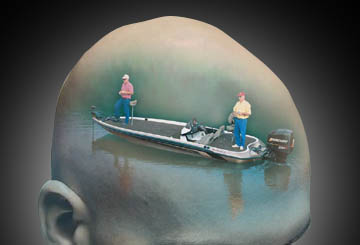Performance Psychology: Now is the time to find an ally
Collaboration necessary for optimal success

In his famous book The Man Who Was Thursday, GK Chesterton tells the story of a policeman, Gabriel Syme, who infiltrates the European Council of Anarchists, each of whom is named for a day of the week. After considerable effort to avoid detection, Syme, who is called Thursday, finds out that another of the Anarchists, Friday, is also a police officer. Chesterton writes: “Through all this ordeal, his root horror was isolation. There are no words to describe the abyss between isolation and having one ally…” As the 2011 fishing season unfolds, keep this thought in mind if you seriously want to improve your tournament fishing success.
Familiar folk wisdom speaks to the advantages of many over one: No Man Is an Island; In Unity there is Strength; Two Heads are Better than One; and so on. However, far too many competitive anglers fail to recognize the wisdom in these sayings. Instead, they press on as rugged individualists, relying on themselves when they should be finding allies and asking for help.
Certainly self-reliance and independence are important, yet collaboration and partnerships are equally necessary for optimal success. Instead of thinking in either-or terms, try imagining independence and cooperative effort as separate yet equal dimensions of learning. It’s like spinning rods and casting rods: Both work, but sometimes one or the other is just the better tool for the job.
Getting an ally, in this case relying on allies for help, is especially important when it comes to evaluating your skills and abilities. A recent research study looked at hundreds of previous investigations comparing peer feedback with self-assessment of job and athletic performance. The saying in clinical psychology that “the group tells the truth” was borne out in this research paper. Peers and friends were twice as accurate as individuals themselves in predicting performance. If you really want to know how you are doing, looking in the mirror for answers is a large mistake.
Instead, try this technique. Think of three guys you fish with whose opinions you respect. Send each of them an email saying something like, “I’m trying to prepare for the upcoming season. What are a couple things you think I could do to put more fish in the boat?” It took me about a minute to type that, and it would take you less time to cut and paste it and send it to a few fishing pals. You might get nothing in return, but you also might send it to six or eight guys, and if you do that, a few people will send you useful replies.
If your fishing group or bass club is serious about skill development, you might even suggest this collaborative learning as a project. In business it’s called 360-degree feedback, where everybody on the team gives feedback to every other member. It works, of course, more often than not, which is why so many companies use it. It could make each person in your club a better angler. Some sports teams do this. I’ve seen 360-degree feedback profit swimming-team members, tennis-club players, and soccer mates. Why not be a pioneer in your area and use this with your fishing partners?
Of course, how you use group feedback is important. The key is to look for trends and patterns in your behavior in the same way you look for trends and patterns in fish behavior. So one fish from the shady side of woody cover might not mean much, but four in a row suggests a pattern. Same way for you: If one guy says your crankbait skills are weak, he may or may not know what he’s talking about; but if two or three other guys agree with him, you probably have some work to do with hard baits.
The other way to use feedback is as an experiment. Let’s say someone tells you he thinks you fish too fast. Just as an experiment, try slowing way down for an hour or two the next time on the water. Doing this may not give you any new information; but then again, it might.
It doesn’t really matter how you get help. Research shows that in the grand scheme of things, it doesn’t even matter who you ask for advice or feedback. Even a rock can be a teacher. But it’s just flat unrealistic to expect yourself to figure out all the keys to being a top angler. So, ask questions whenever you can, stay open to what people say, pay attention to the patterns others identify, and use feedback to make corrections. Or just rely on yourself. Your loss if you do!

————————————————–
Jay T. McNamara, Ph.D., L.P., also known as Dr. Fish, has published his book “The Psychology of Exceptional Fishing.” You can order it by contacting Jay via e-mail at this address: [email protected].
————————————————–
Jay T. McNamara, Ph.D., L.P., is a psychologist, who is also an avid bass and walleye angler. With more than 27 years of professional experience complemented by participation in competitive fishing at local and national levels, he is uniquely qualified to illustrate how performance psychology principles apply to tournament fishing.